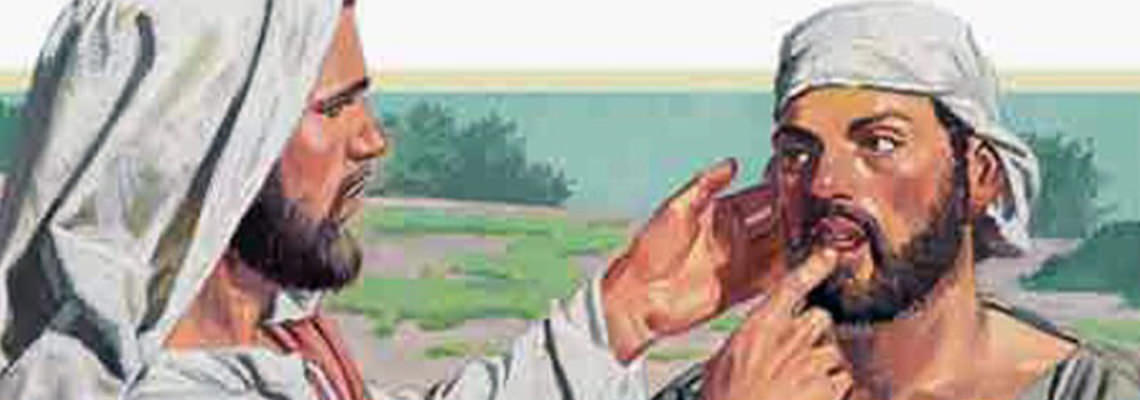It is 05th September 2021. We celebrate the 23rd Sunday in Ordinary Time.
Dear people of God may the Lord give you peace and health in the Holy Spirit.
We reflect on Isaiah 35:4-7; James 2:1-5 and the Gospel of Mark 7:31-37.
“He has done everything well; he even makes the deaf to hear and the mute to speak.” (Mk.7:37).
Happy Teachers’ Day. Thank you one and all for your nobility, agility, loyalty, and docility. May the Lord bless you abundantly for your sacrifice, dedication, commitment and bringing the goodness out of the person and continue to remain as models, motivation, and inspiration our hearts, souls, and lifetime immemorial. With grateful hearts and humility, recalling all the teachers who mentored, chiselled, moulded, infused, enriched, enlighten, encouraged, tickled the mind and heart to be the person as we are today in the field and fame.
The readings invite us to reflect on a crucial question we all need to answer is: How do we align our faith with the living? Are we making the distinction in the life of others or making them feel discriminated in the way we treat them?
In the first reading, God assures through the prophecy of Isaiah telling them to Take courage, for God will save his people. Chapter 35 from Isaiah speaks about the theophany of the Lord and the return of the people. It is the response and prophecy to people who were coming out of Assyrian’s captivity. The prophet assured them that the Lord will take revenge on them and make the people of Israel enjoy all the blessings in their personal and communal life. “Say to those who are of a fearful heart, Be strong, do not fear! Here is your God. He will come with vengeance; He will come and save you.” (Is.35:4). The blind see the deaf hear, the lame leap, the speechless speak, the desert runs with streams, and the thirsty ground filled with springs. These are the conditions of the people of Israel promised by God when they return from captivity.
In the second reading, St. James strongly pointing out the disconnect between faith and the way we treat people. Are we selectively blind and deaf when it comes to serving the poor and listening to the Word of God? Even within the ambience of the church, at times we ill-treat the other person according to their color, caste, status, complexion, and wealth they hold. There is a special treatment for those who are rich, famous, influential, and powerful. “Listen, my beloved brothers and sisters. Has not God chosen the poor in the world to be rich in faith and to be heirs of the kingdom that he has promised to those who love him?” (James 2:5).
One day, as usual, an orphan, a little girl, stood at the street corner begging for food, money or whatever she could get. Now, this girl was wearing very tattered clothes, was dirty and quite dishevelled. A well-to-do young man passed that corner without giving the girl a second look. But, when he returned to his expensive home, his happy and comfortable family, and his well-laden dinner table, his thoughts returned to the young orphan. He became very angry with God for allowing such conditions to exist. He reproached God, saying, how you can let this happen? Why don’t you do something to help this girl? Then he heard God in the depths of his being responding by saying I did. I created you.
In the Gospel, we meet the Lord who is so much admired unboundedly. His style of evangelizing was prophetic, healing with full of respect, inclusivity, and treating the vulnerable and the sick with the utmost sensitivity. He healed them with the authority and power of God by telling them, “be opened.” The messianic prophecy comes from the first reading becomes a reality as Jesus heals a man who was deaf and dumb.
The Gospel of Mark is the earliest of the four Gospels that brings out His humanity and His concern towards the suffering humanity. Laying hands is gesture of invoking God’s blessing for healing at the time of Jesus and so people pleaded Him to touch the man in need of healing.
Samuel was one of the most remarkable gospel preachers in his village in Africa. He was blind and never went to school. Later in life, he joined the Church and had to memorize large portions of the Bible since he could not read. Samuel’s little boy would lead him to people’s houses and Samuel would begin his preaching with the words, “I was blind but now I see!” It was fascinating to see this blind, illiterate man challenging educated and sighted people, and saying, “Now let us turn to John 3:16 and read.” His presence bore testimony not only to physical senses but also the spiritual presence of Christ in his life.
There is a special reference and relevance to our life situations. A lot of folks have chosen to be blind and dead. We too like the man in the Gospel with a speech impediment rather than absolute dumbness. We forget the blessing we all received during the celebration of the Sacrament of Baptism. It is good to recall the Ephphetha or Prayer over Ears and Mouth. “The Lord Jesus made the deaf hear and the dumb speak. May he soon touch your ears to receive his word, and your mouth to proclaim his faith, to the praise and glory of God the Father.”
Even though it is a Messianic sign, it is also held as the secret of Messiah holds good with the sacramental significance.
May the Lord bless each one of us to use our faculty of speech and hearing for the glory of proclaiming the Word of God as the healing moments in our life.
Have a day full of blessings. Please whisper a prayer to the teachers who educated us in the past and mentoring us right now. May God bless all throughout this week.


